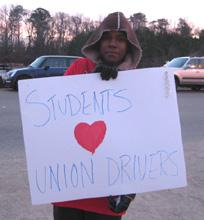Bus drivers hold daylong strike at University of Alabama
By Jake DaSilva, Labor Notes
Bus drivers at the University of Alabama in Tuscaloosa struck Monday after nine months of bargaining left their employer -- a contractor -- still demanding at-will employment and frozen wages.
On Monday morning about 60 drivers, members of Amalgamated Transit Union Local 1208, authorized a strike and took to the picket line to achieve a first contract.
Student activists distributed flyers encouraging people not to ride buses driven by scabs. Just more than half the drivers honored the strike.
Tia Brown, a steward, said drivers make only $9.50 per hour. "That is not a fair wage for people who have a commercial driver's license," she said.
The university brought in scabs and had them drive university vans around the bus routes, but students had longer waiting times because so few buses made it out.
By mid-afternoon a negotiator for the contracted bus operator, First Transit, called ATU International Vice President Kenneth Kirk and asked to hold negotiations immediately.
The strike forced the company to come back to the table and drivers voted to come back to work. While they don't have a clear victory yet, the drivers feel the company's movement is a good sign. They also said that they would be willing to go right back out on strike if the contract offer does not improve.
Small victories, big plans
Strikers reported small successes, including convincing one scab to drive off after a confrontation. Two other workers who were going to cross the line took off their company jackets and joined the pickets. "Nothing's ever going to change if you go in there and work for $9.50!" strikers yelled.
The union's members, officers, and staff are predominantly Black and their fight has given labor struggle a visibility not normally accorded to unions and workers in the Deep South.
The drivers at the University of Alabama formed their union last summer, fed up with low wages, a lack of benefits, and inadequate time off. Their vote was unanimous.
Since that time First Transit, a UK-based multinational, has been stalling in negotiations. The drivers have met with negotiators several times but the offers have been abysmal.
First Transit offered the drivers either less than they are getting currently or about the same in wages and benefits. The company says its contract with the university mandates at-will employment. The union has filed several unfair labor practice charges over the company's firing workers for union activity. ATU represents 12,000 workers nationwide at First Transit.
"This campaign is about fair play for all," said Kenneth Crout, a driver and member.
The union used a Freedom of Information Act request to reveal that the university pays $55 an hour per driver to First Transit, helping its parent company score a $200 million profit through the first half of last year.
Drivers at the University of Texas, also under contract with First Transit, make $11.75 an hour starting pay and top out at $17.
The disparity came to light on Alabama's campus as the two schools prepared to face off at the Rose Bowl, college football's championship game.
"It upset a whole lot of people to find out how badly the drivers were being treated," said Clayton Sinyai, ATU's director of strategic campaigns.
Students leapt on the opportunity to support the drivers. Students for a Democratic Society is phone-banking, collecting petitions, talking to riders on the buses, and writing letters to the student newspaper. Together with documentary filmmaker Ginger Jolly and members of the Student Labor Action Movement, they're making a YouTube documentary about the bus drivers' fight for a living wage.
West Alabama's union community has pulled together to support the drivers, too. The powerful Steelworkers Local 351L has given ATU space at their hall for its base of operations.
Student activists and the union have targeted Robert Witt, the University of Alabama's president. Like countless administrators only too eager to outsource responsibility for the wages and working conditions of people working on their campuses, he has refused to acknowledge the hundreds and hundreds of expressions of support for the drivers.
Recently union members and officials held a meeting with student activists to discuss ways to increase the pressure on First Transit, including by holding peaceful protests on campus.
"We've seen increasing numbers of private contractors coming in to provide service, and this one has come in with the most hostile attitude," Sinyai said. "They used a lot of orthodox union-busting at first, and they are still the most difficult to work with on wages and working conditions."
Jake Da Silva is a graduate student in Library and Information Studies at the University of Alabama and works with the Student Labor Action Movement.

